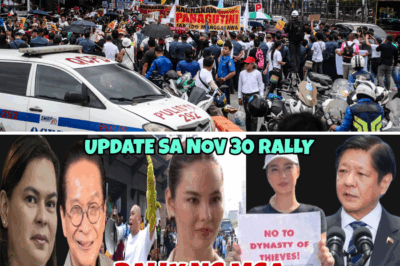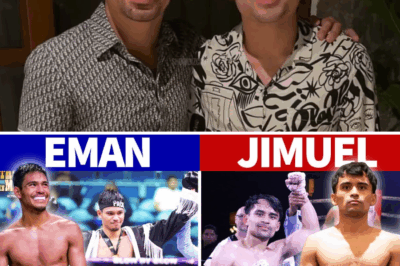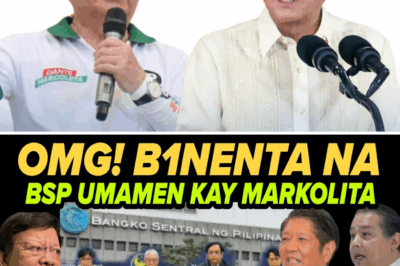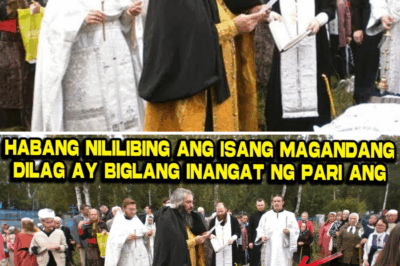The political divide within two of the country’s most powerful families — the Dutertes and the Marcoses — is now more visible than ever.
Following the International Criminal Court’s (ICC) decision to deny the interim release request of former President Rodrigo “Tatay Digong” Duterte, Davao City Mayor Sebastian “Basti” Duterte delivered an emotional statement that quickly went viral nationwide.

“You may have jailed him, meaning Tatay Digong, but you cannot erase the heroism of my father,” Basti declared, addressing critics and international authorities.
His words resonated deeply among Duterte loyalists, who continue to view the former president as a decisive and fearless leader despite the international cases filed against him. But while the younger Duterte stood firm in defending his father’s legacy, the political landscape around him was shifting — and the Duterte-Marcos alliance that once defined Philippine politics appears to be cracking apart.
The ICC’s denial of Duterte’s request sparked not only emotional reactions but also renewed discussions about accountability, governance, and justice. Yet amid this global spotlight, it was Vice President Sara Duterte’s remarks that ignited even more controversy back home.
In a recent interview, the Vice President delivered a pointed jab at President Ferdinand “Bongbong” Marcos Jr., accusing his administration of dragging its feet in tackling corruption.
“The action of the Office of the President in responding to corruption is slow,” she said bluntly — a statement that instantly made headlines.
The criticism didn’t stop there. Sara Duterte went further, hinting that the President’s hesitancy to identify lawmakers allegedly involved in the “flood control” corruption scandal might not be about caution — but self-preservation.
“The President also supposedly can’t name which congressmen are involved in the corruption,” she said. “I think he also can’t say it because it will reach himself — in the office of the president.”
Sara Duterte’s comments came at a time when public frustration with the administration is already at a boiling point.
A recent national survey revealed that 69% of Filipinos are dissatisfied with how the Marcos administration is handling corruption. The report described a “large majority” of citizens who believe that the government’s anti-graft campaigns are failing to deliver real results.
This dissatisfaction coincides with a series of highly publicized investigations into “ghost projects” and anomalous flood control programs, which have drawn accusations of favoritism and misuse of public funds.
For many observers, the numbers speak volumes. “It’s a damning figure,” one political analyst noted. “When nearly seven out of ten Filipinos think corruption is being ignored, that’s no longer just a governance issue — it’s a crisis of trust.”
The once-powerful political alliance between the Marcos and Duterte camps — which dominated the 2022 elections — now seems to be unraveling before the public eye.
Vice President Sara Duterte’s latest remarks follow a pattern of escalating tension between the two families. Earlier this year, she resigned from her cabinet post as Secretary of Education, a move that insiders viewed as a silent protest against the Marcos administration’s policies and leadership style.
Now, with her calling the President’s actions “slow” and “self-serving,” the rift appears irreparable.
“She just said what many people have been thinking,” one supporter commented online. “The government is protecting its own.”
At the center of this growing firestorm is the Independent Infrastructure Commission (ICI) — a newly established body meant to investigate irregularities in the country’s flood control projects.
But instead of inspiring confidence, the commission has been met with skepticism.
“They just want to make the fabricated story legitimate,” Vice President Duterte said, questioning whether the ICI was created merely to control the narrative and shield political allies.
Her criticism echoed across social media, where netizens questioned whether the new body would lead to accountability or serve as another bureaucratic smokescreen.
Meanwhile, in Davao City, Mayor Basti Duterte’s defense of his father painted a stark contrast to the unfolding political chaos in Manila.
For Basti, the ICC’s decision was less about legal defeat and more about legacy. “You can jail my father,” he said passionately, “but you cannot erase the heroism of my father.”
The statement was both emotional and defiant — a reminder that the Duterte family remains deeply loyal to the patriarch who, despite facing international charges, continues to enjoy a strong base of support.
Political analysts view Basti’s comments as a strategic move to preserve the Duterte brand ahead of future elections, especially as the family repositions itself against the Marcos administration.
As tensions rise between the country’s two dominant dynasties, the implications reach far beyond the walls of government.
For ordinary Filipinos, the divide is more than just political drama — it’s a reflection of growing frustration with corruption, power struggles, and leadership that feels increasingly disconnected from public reality.
One commentator summed up the national sentiment: “While the elites are busy protecting their legacies, the people are still waiting for justice, progress, and honesty.”
The ICC continues its proceedings against former President Duterte, while domestic investigations into corruption remain ongoing. The Marcos administration faces the difficult task of regaining public trust amid accusations of inaction and complacency.
As for the Dutertes, both Basti and Sara appear ready to draw their battle lines — one defending the past, the other challenging the present.
In a nation weary of political theater, the question now is whether this clash between two powerful clans will finally expose the truth — or bury it deeper beneath the noise of loyalty, legacy, and power.
News
Ang High-Tech na Mansyon ni Alden: Bakit Ang Dream House ng Aktor ay Literally Katabi ng Bahay ni Kathryn Bernardo
Ang mundo ng showbiz ay isang entablado kung saan ang pangarap ay nagsasaling-wika sa katotohanan, at ang pag-ibig ay madalas…
Araw ni Bonifacio 2025: Ang Trillion Peso March, Pagtawag ni Catriona Gray sa Pananagutan, at Ang “Under Control” na Gulo sa Mendiola
Ang Araw ni Bonifacio, na ginugunita tuwing Nobyembre 30, ay tradisyonal na ginagamit bilang plataporma ng sambayanan upang ipahayag ang…
Ang Laban ng mga Mana: Eman vs. Jimwel Pacquiao – Sino sa mga Anak ni Manny Ang Hahawak sa World Title ng Boxing
Sa mundo ng professional boxing, ang pangalan ni Manny “Pacman” Pacquiao ay hindi lamang isang apelyido; ito ay isang simbolo…
Ginto, Bilyong Insertions, at Ang ICC Drama: Ang Naglalagablab na Katotohanan sa Likod ng Marcos Administration’s Sekreto
Ang pulitika sa Pilipinas ay muling nagliliyab, hindi dahil sa isang kakaibang celebrity gossip, kundi dahil sa mga seryoso at…
Ang Second Life sa Kabaong: Paano ang Isang Pari, na Dating Combat Medic, ang Nagbunyag ng Drug Smuggling at Nagligtas ng Buhay sa Gitna ng Libing
Ang buhay ay madalas na punong-puno ng pagbabago, at ang paghahanap ng layunin ay kung minsan ay matatagpuan sa mga…
Ang No-Fail Test ng Kabutihan: Paano ang Helicopter Crash ang Nagbunyag sa Tunay na Ugali ng Kasintahan at mga Empleyado ng Bilyonaryo
Ang tunay na yaman ay hindi nasusukat sa dami ng ari-arian o sa bigat ng bank account; ito ay matatagpuan…
End of content
No more pages to load












